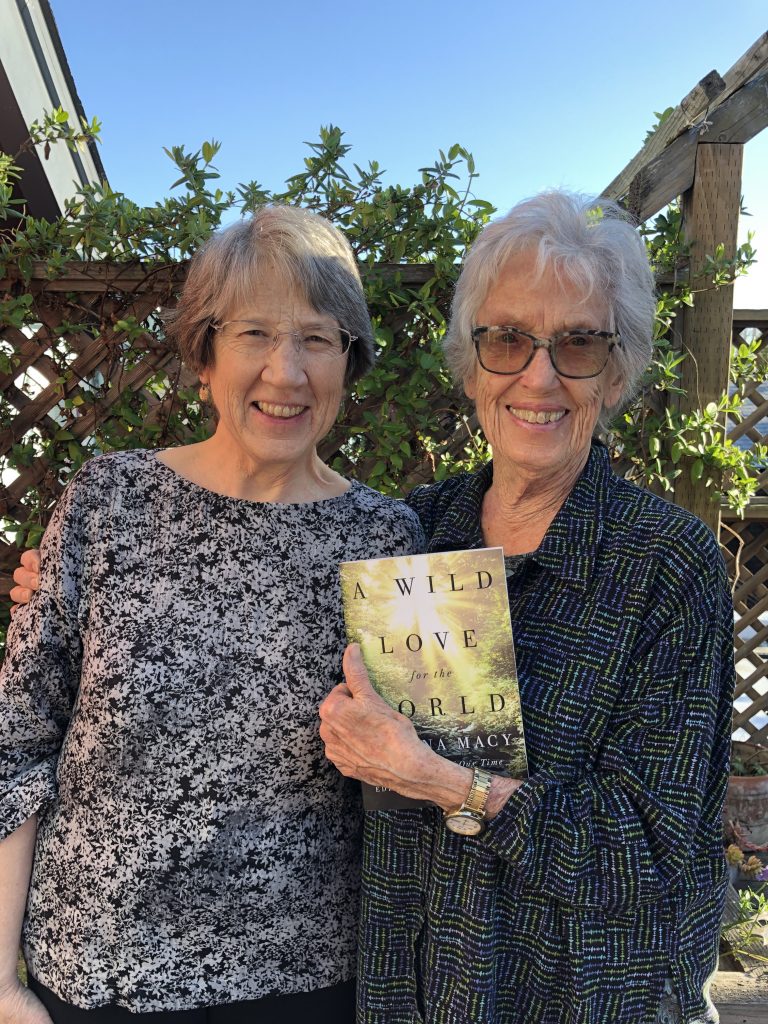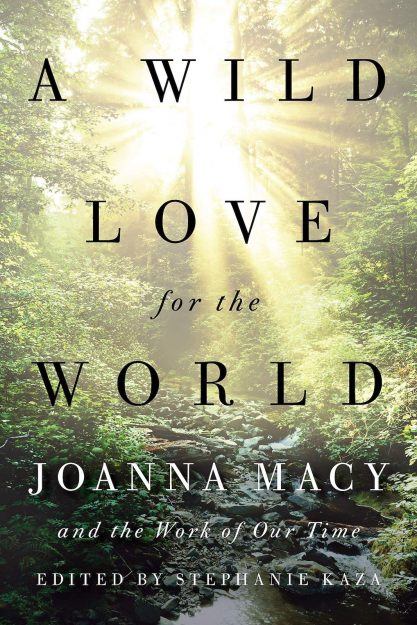If the ecological crisis is one of the greatest challenges that humanity is facing today—then Joanna Macy is arguably one of the most important teachers of our time. For those who don’t yet know her work, this anthology is an excellent place to start. For those of us who have already benefited from it, it provides an overview of an extraordinary woman and her remarkable career.
I’ve read almost all Joanna’s books (everyone calls her Joanna) including her 2007 memoir Widening Circles, but didn’t realize the widespread impact of her writings and workshops. In addition to 11 original essays by Joanna herself, this anthology gathers appreciative contributions from a wide and impressive group of people who have been influenced by her, including military analyst Daniel Ellsberg, theologian Matthew Fox, Sri Lankan activist A. T. Ariyaratne, journalist Dahr Jamail, and philosopher David Abram.
I first became acquainted with her work when I read Mutual Causality in Buddhism and General Systems Theory, a prosaic title for the groundbreaking 1991 book. At the time, I would always underline book passages that seemed especially important to me, but she helped me break that habit: I was underlining everything. She showed how the dynamic, nonlinear interplay and self-organizing feedback emphasized described in general systems theory naturally resonates with Buddhist teachings such as impermanence, nonself, and interdependence. Her book offered an exciting new perspective on the dharma, highlighting Buddhism’s focus on the operational: not what or why, but how—reminding us that Buddhism is a path. The Buddha once compared his teachings to a raft because they are a guidebook: the point is not to accept them, but to use them to transform our lives.
Yet that has not been Macy’s most important contribution. Despite her philosophical acumen, she realized early that it’s not enough to present such key teachings conceptually. Her genius has been the ability to design transformative practices and workshops that enable participants to go beyond an intellectual understanding to an empowering embodiment. Initially she called it despair work, because her workshops helped participants get in touch with their deepest feelings about what is happening to the earth and work through them. Later she linked up with the Deep Ecology movement, and most recently it is the Work That Reconnects. In the process she has created a powerful set of exercises that are now widely used. An important example is the Council of All Beings, in which people identify with an animal from a different species and speak from its perspective.
A Wild Love for the World includes many moving personal stories. Joanna was the first American ever to be expelled from Sri Lanka (for reasons unclear, probably her nonviolent direct action training sessions with Tamils). She helped to found the Nuclear Guardianship Project, which advocates for alternative ways to deal with the nuclear waste that continues to accumulate. With poet and translator Anita Barrows, she translates the poetry of Rainer Maria Rilke, published in books I cherish.
Her teaching has taken her to more countries than can be listed here, and today students (many of whom contribute to this volume) are bringing her workshops to many more, such as China and various nations in Africa. Joanna Macy has founded a movement that, better than anything else I know, addresses directly our particular moment in planetary history: when humanity has for the first time achieved a truly global civilization, but one that, alas, is self-destructing. Her most recent books, Coming Back to Life (co-authored with Molly Young Brown) and Active Hope (with Chris Johnstone) have become indispensable resources for this movement.
In the afterword she shares the motivation for her lifework. “Carl Jung once said that at the core of each life’s journey is a question that we are born to pursue. For me, that question has been How can I be fully present to my world—present enough to rejoice and be useful—when we as a species are destroying it?” The Great Turning she promotes involves three components: holding actions, to preserve what still remains; dismantling dysfunctional social structures while building alternatives; and changing consciousness. Buddhism emphasizes the third, of course, but can practitioners today really ignore the necessity for the other two?
One of her contributions retells the Shambhala prophecy she learned from Tibetan Buddhist teacher Choegyal Rinpoche. In a time when all life on Earth is in danger, the Kingdom of Shambhala will emerge, not as a place, but in the hearts and minds of Shambhala warriors, who have no uniforms or insignia, and no territory of their own. What they do have is the moral and physical courage to challenge those responsible for the destruction. In order to do this, they develop the two most powerful weapons of all: compassion and wisdom, the two pillars of the Buddhist path. Compassion by itself is too hot—it can burn you out. Wisdom by itself is too cool. We need both.
Joanna Macy’s life and work not only demonstrate how to be a Shambhala warrior, she also points the way forward for contemporary Buddhism. Whenever Buddhism has spread, it hasn’t just imposed itself but has interacted with the local culture, and ended up creating something new. For example, Chan (Jp., Zen) Buddhism developed in China from the encounter between Mahayana and Taoism. Today the ecological emergency (which is much more than the climate emergency) is just as much a crisis for Buddhism, which is challenged to “respond appropriately” to an unprecedented situation that also threatens its own survival. Although I do not know if Joanna still considers herself a Buddhist teacher, her teachings embody the best of the tradition by working for what is most compassionate and liberative—not only for human beings but for the rest of the biosphere as well.
In the process, she rejects obsolete myths about solitary yogis attaining unexcelled enlightenment in their caves, sequestered from the rest of the world. As she writes in this book: “The world itself has a role to play in our liberation. Its very pressures, pains, risks can wake us up, release us from the bonds of ego, and guide us home to our vast true nature.”
Today it has become obvious that we cannot separate our own individual awakening from the larger social transformation that is so urgently needed. It is by rising to that challenge that Buddhism can remain most true to its essential message and fulfill its potential. No one has done more than Joanna Macy to make Buddhism relevant today.
Listen to Joanna Macy in conversation with Tricycle’s Editor and Publisher James Shaheen.
♦
A Wild Love for the World: Joanna Macy and the Work of our Time, edited by Stephanie Kaza (Boulder: Shambhala Publications, 2020).
Thank you for subscribing to Tricycle! As a nonprofit, we depend on readers like you to keep Buddhist teachings and practices widely available.

